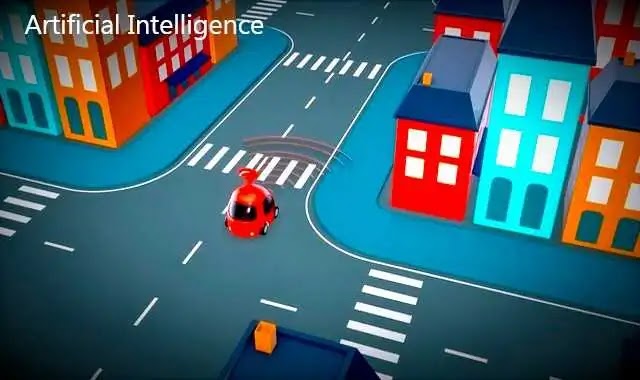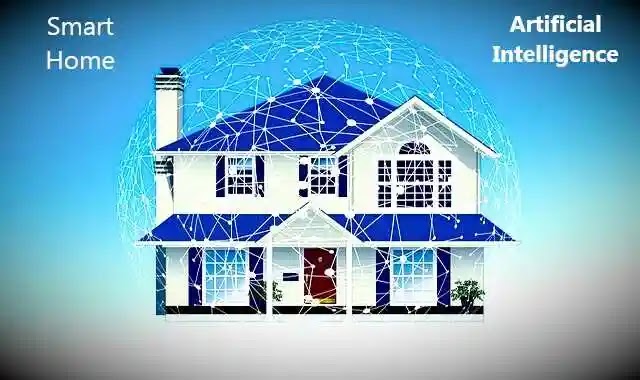If you believe Elon Musk, then you think artificial intelligence is going to kill us all. But at the same time, you deal on a daily basis with machines and devices powered by artificial intelligence, from computers and smart phones to home appliances, cars and so on.
If it is true, artificial intelligence can save the earth and those on it from any dangers or cause the destruction of everything, depending on how it is used.
In this article, we will explain the history of artificial intelligence, what it is, and its most important applications and uses in various fields such as education, medicine and other fields.
The history of artificial intelligence
During World War II, the famous British computer scientist Alan Turing cracked the Enigma symbol that German forces used to securely send messages between themselves.
Alan Turing and his team created a machine called the Bombe that was used to decode Enigma messages about German forces.
Bombe and Enigma laid the foundations for machine learning, and from there to artificial intelligence. According to Turing, a machine that can talk to humans without knowing it is a machine can be said to be an "intelligent machine".
The beginning of the use of the term "artificial intelligence"
The term artificial intelligence dates back to the middle of the last century, specifically in the 1950s, when Alan Turing performed a few tests called the Turing Test, and the aim of this test was to measure the ability of machines to display an intelligent equivalent behavior that cannot be distinguished from human behavior.
A few years later, the term artificial intelligence was formally coined by John McCarthy, at the famous Dartmouth workshop.
He stated at the time with the following phrase: Every aspect of learning or any other feature of intelligence can, in principle, be described so precisely that a machine can be constructed to simulate it. We will try to discover how to make machines use language, abstract ideas and concepts to improve themselves and develop themselves.
Also read: What is the Internet of Things and how will it affect our future?
The transition of artificial intelligence to the stage of seriousness
In 1951, a machine known as Ferranti Mark 1 successfully used an algorithm to master the Checkers, a game similar to chess. Next, Newell and Simon developed an algorithm for solving general problems in mathematics.
Also in the 1950s, John McCarthy, often known as the godfather of artificial intelligence, developed a programming language known as LISP, which later became very important in self-learning.
In the 1960s, researchers emphasized developing algorithms for solving mathematical problems and engineering theories, and in the late 1960s, computer scientists worked on machine vision learning, self-learning development, and robotics design. And in 1972, the first robot named WABOT-1 was designed in Japan.
The beginning of a new millennium with new opportunities
In the late 1990s, American companies became more interested in artificial intelligence, and the Japanese government revealed plans to develop a fifth generation computer to advance the self-learning process.
artificial intelligence enthusiasts believed that soon computers would be able to conduct conversations, translate languages and interpret images just like a human would.
And in 1997, the American giant IBM developed a robot that plays chess known as Deep Blue, and this robot outperformed the world famous chess champion Gary Kasprof.
The tremendous development in the field of information storage has enabled companies to store extremely large amounts of data, and in the past fifteen years giants such as Amazon, Google, Baidu and other artificial intelligence and self-learning have taken advantage of.
In particular, by processing users' data to understand their behavior and how they deal with the products of these companies.
These companies continued to work on improving computer visibility, developing avenues for self-learning for machines, and a whole host of other artificial intelligence applications.
Even machine learning has become embedded in many online services that we all use on a daily basis. As a result, the technology sector is today the leader of the US stock market and by extension the global economy as a whole.
Definition of artificial intelligence
Artificial intelligence is the ability of computers or machines to perform tasks that require thinking and intelligence, which a person usually does. This term is frequently applied to the process of developing systems that have human intellectual processes, such as the ability to think, discover meanings, or learn from past experiences.
Since the development of digital computers in the 1940s, it has been demonstrated that computers can be programmed to perform extremely complex tasks. For example, discovering evidence for mathematical theories or playing chess with great dexterity.
However, despite the terrible progress made by artificial intelligence companies in the speed of computer processing and the ability of memory to store various data, there are still no programs or machines that can match human flexibility in broader fields or in tasks that require a lot of daily knowledge. .
On the other hand, some programs achieved the performance levels of human experts and professionals in performing certain specific tasks, so that the means of artificial intelligence were strongly present in various applications such as medical diagnostics, computer search engines, voice recognition or handwriting.
Psychologists generally distinguish human intelligence not by just one trait, but by the combination of many diverse abilities. Therefore, research in artificial intelligence has mainly focused on the following components of human intelligence: self learning, thinking, problem solving, perception, and the use of different languages for communication.
Artificial Intelligence Applications
Machines aren't taking off yet, at least not yet. However, they infiltrate and control our lives to a great extent, machines and smart devices have a great deal of control over how we live, how we do business and certainly our entertainment process.
Starting with personal assistants who support voice, talk to users and receive orders from them to complete some tasks instead of them, such as Siri, Alexa, Cortana, and others, to basic technologies such as behavioral algorithms that save users' behavior to identify their lifestyle.
In addition to search engines that have come to expect - or more precisely, they know in advance - what users want to search for, in addition to self-driving cars, there are many examples and applications of artificial intelligence that we use on a daily basis in our lives now.
artificial intelligence stocks
While companies like Apple, Facebook, and Tesla offer innovative updates and revolutionary changes in how we interact with self-learning technology, many of us are still clueless about how artificial intelligence is used today by companies large and small.
How much impact will this technology have on our future lives? What other ways will it permeate our daily life? And how much improvement will it make in our near or long term?
The artificial intelligence systems prevalent nowadays are just advanced self learning software with comprehensive behavioral algorithms that adapt to our desires and hate, although these devices are very useful, they do not become more intelligent in the existential sense.
But it is working on improving its skills based on a large data set that it obtains by tracking and recording everything that its users do.
Here are some of the most popular examples of artificial intelligence applications in use today:
1- Personal assistant
Everyone is familiar with the Apple personal assistant known as Siri. It is an application found on various Apple devices such as iPhone and Mac, which works to provide solutions and voice and written interaction with the user.
Siri helps users find information, provide directions and suggestions, add events to calendars, and it helps them send mails and accomplish some other tasks. The Siri app uses artificial intelligence algorithms to become more intelligent and more able to predict and understand users' questions and requests.
Amazon first introduced Alexa as a personal assistant like Siri, but then Alexa was promoted to become a standalone device that acts as a central home assistant, and what made Alexa a unique revolutionary product is its intriguing ability to decode speech from anywhere in the room.
It can help us search the web for information, shop around, set appointments, set alarms and millions of other tasks.
2- Self-driving cars
What is the future of transportation? Indicators suggest that you will likely spend much less time behind the wheel, with the proliferation of self-driving cars, which means that some scenes from science fiction films are now real, and more will be available soon.
Cars today already have many features that make them semi autonomous, such as parking assist systems and autonomous brakes.
There are also currently fully autonomous cars, which are able to operate without any human intervention, and it is possible that you are familiar with the version of Google that grabbed the headlines in the Google Chauffeur program, and the company has introduced it to the self-driving car market now.
If you don't own a Tesla model, you have no idea what you're missing. Perhaps this is one of the best cars out there, not only for having so many accolades, but for their predictive capabilities and self-driving benefits.
Anyone who loves technology and cars needs to own a Tesla car, and these vehicles are getting smarter thanks to the updates available frequently.
3- Smart Home
When you are not at home, some pesky doubts can start to take hold of your mind. Has the coffee maker shut down? Are the kids doing their homework or watching TV? Did you turn off the gas valve?
But with smart home technology, you can calm all these worries with a quick glance at your smartphone or tablet device, which is connected to your home devices so that you can control them remotely or so that these devices control each other without the need to return to you.
These smart homes operate by means of the Internet of Things technology, which is a term that refers to objects and devices that are linked between them through digital networks.
The number of web-like devices is growing more and more every day, all the electronics in your home are part of that technological revolution, from the refrigerator to the oven to your computer.
Is artificial intelligence Really Going To Die for All of Us?
Some people, like the famous businessman Elon Musk, have doubts and anxieties that we are on a path to doom. Where there are super robots that can ultimately decide that they know better than we do, and use their skills to kill us all or destroy the Earth and its people, or something like that.
But in fact, there is no threat at least so far, but Musk may have an opinion, if we are going to give machines human-like capabilities, we must seriously think about how to ensure that they are not using those capabilities to harm us.
But at the moment, I don't think there is any risk that the smart dishwasher is planning to get rid of you and your family members because you have overloaded it with work!




Comments
Post a Comment